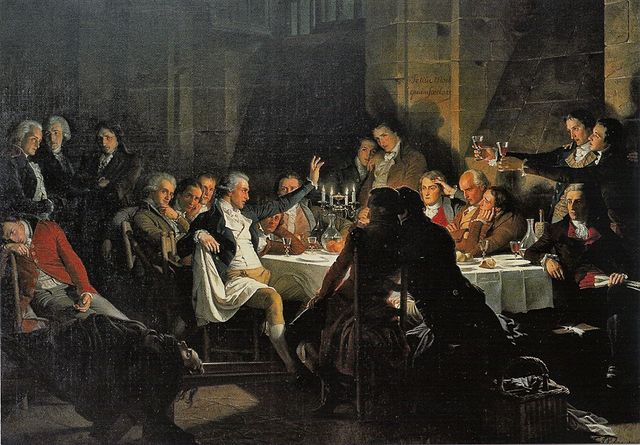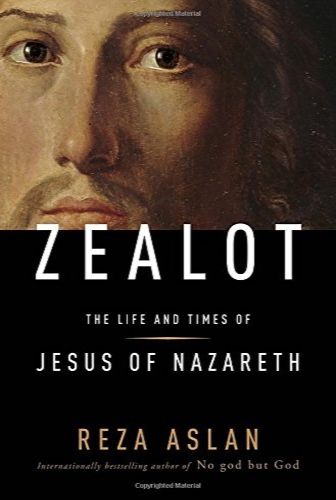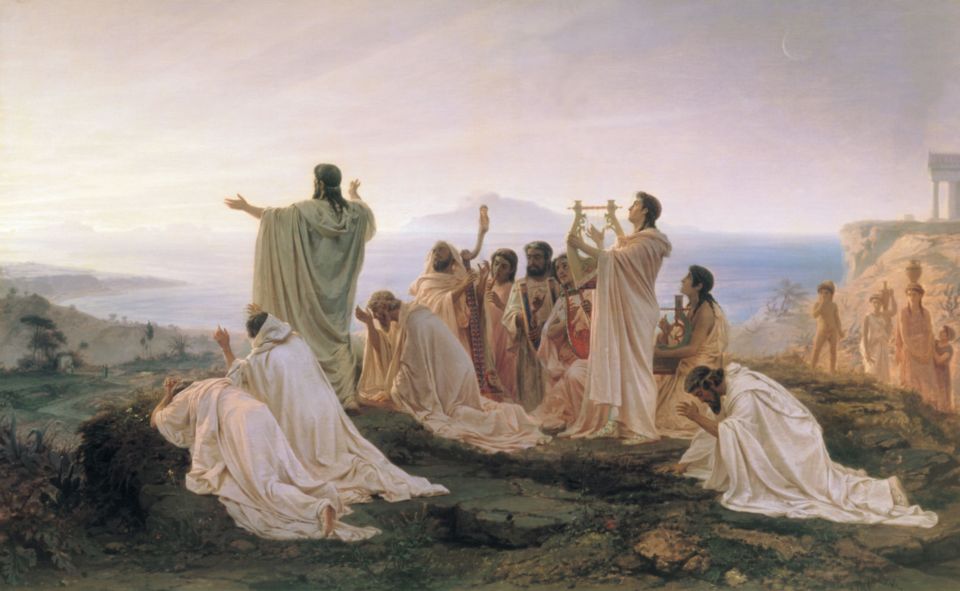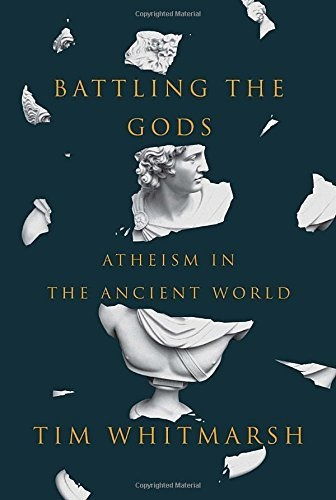As with Steven Pinker’s earlier The Better Angels of Our Nature, of which this is really an expansion and elucidation, I was frustrated by this book.
On the one hand, Pinker is an able thinker and clear writer, free of much of the ideological cant and distortions of vision that today accompany most writing about society (for society is what this book is about), and he is mostly not afraid to follow his reasoning to its conclusions.
His data on human progress is voluminous, persuasive, and extremely 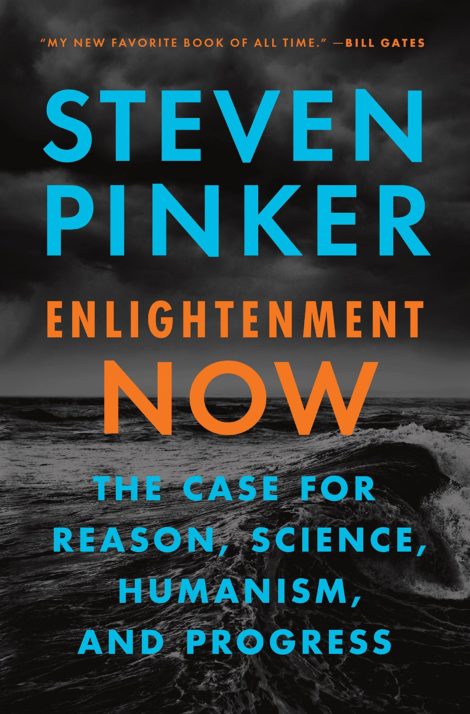 interesting. On the other hand, Pinker regularly makes gross errors about history, some of little import, but some that undermine the entire thesis of his book—which is that that the Enlightenment is the sole cause of the human progress he illustrates.
interesting. On the other hand, Pinker regularly makes gross errors about history, some of little import, but some that undermine the entire thesis of his book—which is that that the Enlightenment is the sole cause of the human progress he illustrates.
I like Pinker for his clarity of mind. And since I have been reading a steady diet of books whose central claim is that the Enlightenment was a mistake, and moreover I am personally enamored of Reaction, the idea of creating a new thing by reference to the old, it is only fair that I consider the opposite ideas presented as well as possible.
Moreover, this book claims to answer exactly a current question of mine—is the material marvel that is the modern world the child of the Enlightenment? I was not disappointed; this book is just what the doctor ordered, at least to clarify my own thoughts, though probably not with the result Pinker intended.
He wants to prove the Enlightenment is responsible for everything that is good in the modern world, and every good thing that will be in the future, but he ends up, for the most part, refuting himself on all his key claims. Still, the ride is interesting enough and that alone makes his book worth reading.
On the second page of his book, Pinker enunciates the core of his argument, by referring to “the Enlightenment principle that we can apply reason and sympathy to enhance human flourishing.”
The next sentence, by implication, defines the Enlightenment further as “the ideals of reason, science, humanism, and progress.” The following paragraph says the Enlightenment is “also called humanism, the open society, and cosmopolitan or classical liberalism.”
All this creates a somewhat confused definition, but once you read the whole book, it’s evident that to Pinker, the middle sentence is the key—the Enlightenment consists in the primacy to human societies of “reason, science, humanism, and progress.” His book revolves around these four concepts, and we will return to each of these concepts in turn.
Pinker divides his book into three parts. The first, shortest, part expands on what Pinker means by “the Enlightenment.” Here, Pinker begins by turning to the driver of all the progress that he details at great length later in the book, namely, the Scientific Revolution. “The Enlightenment is conventionally placed in the last two-thirds of the 18th century, though it flowed out of the Scientific Revolution and the Age of Reason in the 17th century.”
Given that the term “Age of Reason” is only used in one other place in this book, at the very end in a similar context, while the terms “Enlightenment” and “Scientific Revolution” are used continuously, it seems fair to conclude that Pinker believes that the Scientific Revolution (actually beginning in the 1500s, and possibly earlier, not “in the 17th century”) was the necessary first step that combined with the Enlightenment to produce the benefits of the modern world.
Pinker reinforces this conclusion by summarizing the modern understanding of scientific progress to include entropy, evolution, and information. Grasping these three underlying drivers of scientific progress, Pinker tells us, allows a more complete approach to scientific understanding, and thus of the Enlightenment.
All this is true. The problem with this definition of the Enlightenment, though, is that it is all about the Scientific Revolution, from its inception to today, and when you look closely at it, has nothing to do with the Enlightenment.
The Scientific Revolution led to technology, which ultimately (with some other drivers that are endlessly debated) led to the Industrial Revolution, which created nearly all the progress Pinker spends the second part of his book documenting. But this eliding of the Enlightenment with the Scientific Revolution is the fatal error of Pinker’s entire book—every chapter, and practically every page, is shot through with it.
Pinker claims for the Enlightenment, a system of political and philosophical principles with a nearly exclusive focus on increasing liberty, the advantages of created by the Scientific Revolution, a pre-Enlightenment happening whose success, and whose single-handed creation of the modern world, had essentially nothing to do with the Enlightenment.
Pinker does this because he wishes to advocate for Enlightenment principles (in particular, emancipation and atheism), but justify those principles almost wholly by reference to the achievements of the Scientific Revolution. This is a neat parlor trick, but intellectually dishonest.
I cannot tell whether Pinker realizes the dishonesty, or merely has wandered so far into the weeds he cannot think clearly. In either case, the effect is to make some parts of the book fascinating, and others risible.
There are many, many claimed reasons for why the Industrial Revolution occurred, and why it only occurred in the West. But no serious historian claims that it was the Enlightenment that caused the Industrial Revolution, which is no doubt why Pinker glosses over the supposed linkage and offers no citations tying the Enlightenment to the Industrial Revolution (or, for that matter, to the Scientific Revolution).
For a man dedicated to carefully parsing the evidence and linking causal chains through reasoning, this is a glaring omission. Fortunately for the reader, though, these first philosophical musings, or ramblings, only take up the first thirty-five pages of the book.
The next 300 are an endless, and endlessly fascinating, series of statistical analyses about various forms of (mostly material) progress. In the final sixty pages, the last third of the book, Pinker returns to philosophy, attempting to synthesize the progress he has demonstrated with his other claimed keystones of the modern world, reason, science, and humanism.
Pinker’s basic point about progress is a broadening of his claims about peace in The Better Angels of Our Nature—that those who think the world is getting worse are wrong, not (mostly) from malice, but from various forms of psychological bias, such as the “Optimism Gap” (people see their own lives as better than other people’s); “Availability Bias” (we make decisions based on data easily available to us, which is often weighted toward the negative); and “Negativity Bias” (it’s easier to imagine how things could be dramatically worse than how they could be dramatically better).
To prove this, Pinker offers fourteen separate chapters, each covering a totally different area of progress, demonstrating that since the Scientific Revolution human conditions have gotten better.
Pinker starts with Life—he shows how life expectancy, both at birth and at later periods of life, has dramatically increased over time—or, rather, since the Industrial Revolution in the West, and since the early twentieth century in much of the rest of the world. Next is Health, to much the same effect.
In both chapters, Pinker relies heavily on Nobel Prize-winner Angus Deaton’s The Great Escape, a fascinating book. But Pinker’s philosophical confusion shows up every time he makes other than statistical claims—for example, he tells us that “Deaton notes that even the idea that lies at the core of the Enlightenment—knowledge can make us better off—may come as a revelation” to some (i.e., the non-Western) parts of the world. There are two problems with this.
First, that is not the “idea that lies at the core of the Enlightenment,” it is in an idea that, in the West, far pre-dated the Enlightenment, as I discuss further below. More to the immediate point, that’s not what Deaton says (since I have a copy of his book, I checked).
What Deaton actually says is that people in poor countries are often satisfied with their health, not knowing it can be better. He saying nothing about the Enlightenment, or knowledge in general. Unfortunately, such appeals to authority are common in Pinker’s book (surprising, since appeal to authority has been identified as a basic logical fallacy for millennia), and when the authority is mis-cited, it makes matters worse.
(The reader’s suspicion is further exacerbated by Pinker’s frequent habit of not offering page cites, just footnotes to books as a whole, though he does give a page cite to Deaton’s book.)
Anyway, Pinker next turns to food (Sustenance), where he again talks about the Scientific Revolution (including its modern continuation in Norman Borlaug’s Green Revolution) feeding the world, and then tries to claim that it was an accomplishment of the Enlightenment, and failure to feed people as shown by Stalin’s terror famines was because (supposed) Enlightenment values weren’t honored. That’s a stretch.
Next is wealth, where Pinker focuses on GDP per capita, showing the takeoff since the Industrial Revolution in the West and more recently in some Asian countries, and the reductions in extreme poverty in other countries that have not experienced the same kind of takeoff.
Following is Inequality, which Pinker acutely and subtly analyzes (channeling Thomas Sowell in some cases—you can tell that Pinker is, in many areas, broad-minded by the several times he cites Sowell for different propositions, since Sowell is anathema to doctrinaire leftists).
Then Environment, noting that other than global warming, the environment is doing just fine and shows every sign of doing better in the future, on every metric.
In particular, he notes how resource apocalypses, from Peak Oil to supposed shortages of rare earth elements, are invariably falsified, by technology in general and by hard work enabling us to produce better things with less material. He also covers Peace, updating his earlier book Better Angels, and Safety, noting the declines in homicides and accidents. He quickly dismisses Terrorism as a tempest in a teapot.
It’s not just material progress that Pinker covers, although that’s the focus. It’s also moral progress—we are, among other things, nicer to people. Less torture, fewer executions, more value assigned to human life and happiness.
True enough, but a necessary leg of Pinker’s entire argument is that there was no significant moral progress prior to the Enlightenment, since prior progress would disprove the causation he claims. But prior progress in the West was very great, as anyone with any grasp of history knows.
Christianity immediately obviated many of the worst moral behaviors of the Ancient World (variants of which are still common in non-Christian cultures), from infanticide to the Roman practice of starving children to death in sight of a banquet, to distill their organs into love potions that would enhance desire.
Christianity further led to the rule of law and was instrumental in the creation of the institutions that made possible the Scientific Revolution. All these moves forward, as Pinker documents while glossing over their cause, led to further moral gains. To hide his embarrassment at these pre-Enlightenment advances, Pinker chants, over and over again, the same trite phrases about “endless religious wars” and repeats boring anecdotes about witchcraft and bearbaiting.
After these convincing chapters (convincing for their substance, at least), Pinker covers some softer topics, somewhat less successfully. Generally, the less harder-edged and susceptible to statistical analysis the topic, the worse Pinker does in showing that actual progress is being made.
In fairness, though, it is true these softer topics, to the extent one agrees they constitute actual progress comparable to that covered in the earlier chapters, are more tied to actual Enlightenment ideas.
First up is Democracy, which he claims is increasing, but Pinker helps himself over the finish line by defining democracy as basically any good government, one which “threads the needle, exerting just enough force to prevent people from preying on each other without preying on the people itself.”
That, along with other definitional broadening from Karl Popper and John Mueller, means that democracy is redefined as any government with the rule of law and some responsiveness to public opinion. But in any case, there’s more democracy, however defined, and that’s Progress.
Next is Equal Rights, where Pinker goes full Left, trumpeting all emancipation as good for what ails a society, and all failure to emancipate as evil incarnate (although he seems confused, since what is evil, anyway, to someone who denies the reality of moral abstractions other than utilitarian ones)?
He does try to give a scientific gloss to his philosophical attachment to emancipation, ascribing it to more wealth means more people seek self-actualization, and want the same for others. This he then extrapolates to a claim that liberal values are spreading everywhere, with a lot of graphs (though we’re never told what “liberal values” are being measured, but by implication they overlap with “emancipative values”).
Then Knowledge (we know more, and we’re getting smarter); Quality of Life (we work less and both the necessities and luxuries of life are cheaper); and Happiness (we are happier, largely because we’re richer, though Deaton covers this much better and more subtly).
Along with Daniel T. Rodgers, Pinker huffily rejects Robert Putnam and others who point to the atomization of American lives as a problem, with the flip response that “Users of the Internet and social media have more contact with friends” and they “remain as satisfied with the number and quality of their friendships as in the decade of Gerald Ford and Happy Days.”
But this is obtuse. Putnam’s claim wasn’t that people didn’t have friends anymore, it was that the intermediary institutions that were the entire basis of the success of any successful, and in particular, the successful American, society had been completely destroyed, resulting in the cascading baleful effects that Tocqueville and Robert Nisbet had earlier identified and feared.
Pinker totally fails to make this connection, or more likely deliberately obfuscates it (which is probably why he refers to fears of social atomization as a “hysterical misconception”—that’s protesting too much). Not to mention that Putnam would have told him, too, that the problem was well under way by the time of Gerald Ford, so the 1970s are probably not the best comparison decade to today.
Finally, Pinker points out that Existential Threats, from Y2K to bioterror, are grossly exaggerated. Sure, we can’t know the future, but on balance, we’re not all likely to wink out of existence next week, or next millennium.
Of the supposed threat from artificial intelligence, he says “the scenario makes about as much sense as the worry that since jet planes have surpassed the flying ability of eagles, someday they will swoop out of the sky and seize our cattle.” Ha ha. He’s also heinously sexist. “There is no law of complex systems that says that intelligent agents must turn into ruthless conquistadors. Indeed, we know of one highly advanced form of intelligence that evolved without this defect. They’re called women.”
I like all this, and agree with much of it (although I could do without the constant references to Mama Cass and the Beatles, reminding me Pinker is stuck, in many ways, in the 1960s—and he is writing primarily for aging Boomers, staring down both barrels of their mortality, wondering if their lives of self-indulgence were really as pointless as they now seem).
I am mostly a techno-optimist myself. However, Pinker’s greatest technical error, as opposed to failure of vision, is to believe (like Joseph Tainter) that if it can’t be quantified, it doesn’t exist. I’m a quantitative guy, personally—I have an MBA with finance and accounting concentrations from the Booth School of Business, and my wife correctly says I view the world as Neo does in the last scenes of The Matrix—as cascading columns of numbers underlying the perceived, but merely surface, reality of things. Certainly, non-quantifiable views of human flourishing are subject to errors of perception, which is probably why Pinker repeatedly excoriates the Romantics.
But Pinker is too quick to reject that humans seek transcendence, and all the new flavors of Doritos and life extension in the world isn’t going to change that. “Man shall not live by bread alone.” Pinker is fond of quoting Jesus, always with a sneer, but he does not offer us that truth, because it scares him, since it cannot be quantified.
But the unquantifiable aspects of progress are a topic too long to get into in this review. Pinker wraps up Progress by talking about its future. He does this by making totally unsupported claims about the origin of Progress. “Since the Enlightenment unfolded in the late 18th century, life expectancy across the world has risen from 30 to 71, and in the more fortunate countries to 81.” “The Enlightenment is working: for two and a half centuries, people have used knowledge to enhance human flourishing.”
Therefore, it’s going to continue, don’t you know? No logic is offered, just repetition of the mantra of “knowledge” and trying to tie the Enlightenment to the Scientific Revolution by repeatedly mentioning them in the same breath. It’s not convincing; in fact, it comes across as desperate.
Embedded within all this proof of progress (for proof is what it is—we can quibble, or call it incomplete, but only a fool would say that material progress since the Scientific Revolution and the Industrial Revolution has not been immense), is the truth, difficult for some to accept, that all this progress was caused purely by, and until recently only affected, the West.
It is the Western world that has gotten better—and finally, after 400 years, some of those benefits have been adopted by others. That’s it. This is not a global phenomenon in cause, and it may not be a global phenomenon in effect, if the inferior cultures of the world, for whatever reason, refuse to accept the gifts offered by the Western Scientific Revolution.
Pinker doesn’t make this point, either, though I can see why—it’s inflammatory and distracts from his argument. (He does admit that his first love, the Enlightenment, was a wholly Western phenomenon, a topic he shuffles away from quickly, mumbling about how ideas have no home, which may be true, but they do have a birthplace.)
There are two topics related to Progress that Pinker avoids like the plague, mentioning them only in passing and in lists of other, related topics. Those are slavery and abortion. Why he avoids them is obvious, if you give it a little thought. Slavery he avoids because all progress toward eradicating it was based on religious belief; the Enlightenment had nothing to do with it.
Slavery had been increasingly frowned upon by the Church, to the point of disappearing in Europe long before the High Middle Ages. It made a comeback outside Europe with the conquest of the Americas, with intense debate about its morality applied to Africans and Indians within a Christian framework, and it was solely Christian believers in England and America who ultimately pushed for the ending of, and ended, slavery.
Pinker’s beloved Enlightenment had nothing to do with it, and in fact most of his precious Enlightenment thinkers, like Jefferson, were fine with slavery. This is not convenient to the thesis that religion is poison and the Enlightenment made us all free, so it is glossed over. For similar reasons, Pinker avoids abortion. If violence is decreasing, and infanticide is a horror equivalent to public torture-executions, why is abortion OK? Pinker never explains, and in fact he once lists abortion in a list of bad things in which the United States leads, including homicide and incarceration.
The reader suspects that Pinker is either unable to overcome his own internal cognitive dissonance, or is afraid of no longer being invited to the right parties if he suggests that abortion should be treated as a moral bad. (In fairness, he did address this in Better Angels, where he admitted that abortion logically is indistinguishable from infanticide.)
Another topic that Pinker studiously avoids is China. Yes, he mentions China in various sections on Progress. But since China embodies the very opposite of Enlightenment political thought, in particular “emancipatory values,” its progress is hard to square with Pinker’s thesis that the Enlightenment is solely responsible for all progress.
It is easy to square, though, with China adopting Western science and rejecting Western political values. Which is exactly what has happened, which suggests those political values are not, in fact, important for, or even related to, progress. Again, though, the reader is offered no thoughts in this direction.
Pinker only sees two possible threats to ever more progress. The first is economic stagnation, which he dismisses the possibility of with, in essence, “not going to happen because I say so.” Not for Pinker grappling with Robert Gordon’s The Rise and Fall of American Growth and its claims that productivity is likely to stay low (which he does mention), or Peter Thiel’s lament, “We wanted flying cars, instead we got 140 characters.”
Mostly he doesn’t grapple with those arguments because he’s falling all over himself to get to the real threat to progress: Donald Trump. Pinker offers an insane list of caricatures and falsehoods about Trump and, more generally, all Republicans, for good measure throwing in pro-Brexit Britons. Did you know that Trump opposes all of Life, Health, Wealth, the Environment, Safety, Peace, Democracy, and more? That is, Trump is opposed to Progress, and wants to strangle it, then throw its body into a fire and dance naked around it.
Pinker does everything but Photoshop a picture of Trump with a red suit, a tail, horns, and a pitchfork and fold it into the center of his book. This section goes on in this vein at great length, but in the entire book, every few pages, Pinker snarls and foams at the mouth about Trump, attacking him irrelevantly while discussing unrelated topics. I suppose, like the mad dog he resembles here, Pinker can’t help it, since he very evidently suffers from Trump Derangement Syndrome, which relates to the older Leftist Derangement Syndrome in the same way that Ebola does the common cold.
But it’s at this point that Pinker’s book starts to go off the rails. Not the stuff about Trump—that’s just boring, and par for the course in these days of #Resistance (though it is certain to make the book date badly, whatever the future holds—authors do themselves no favors by ranting about the politics of the moment in books not about the politics of the moment).
And Pinker generally appears to have none but the most simplistic grasp of politics—not for him any references to any political thinker, from Spartans to Athenians to Machiavelli. No, it’s his final three chapters, on Reason, Science, and Humanism, that cause Pinker to implode.
This is where Pinker exalts what he claims are the principles of the Enlightenment, without making any attempt to actually show they were the basis of the Enlightenment, re-defining them to avoid the inconvenient truth that reason and science pre-dated the Enlightenment, and Humanism has nothing to do with progress.
As far as reason, Pinker first rambles about various cognitive biases that limit reasoning. Then he notes that conservatives and liberals are equally subject to these biases. Having established his impartiality, he throws it in the trash, attacking only conservatives viciously and at length (Jonathan Haidt would be appalled).
He starts by claiming “the first modern conservative, Edmund Burke, suggested that humans were too flawed to think up schemes for improving their condition and were better off sticking with traditions and institutions that kept from the abyss,” which falsely suggests (without quite saying it) that Burke, and by extension all conservatives, are opposed to all reason and therefore all progress (and miscasts Burke, of course). After various sonorous paragraphs about predictive bias and the like, Pinker returns to “the major enemy of reason in the public sphere today—which is not ignorance, innumeracy, or cognitive biases, but politicization.”
It’s a little bit of a problem that all academia has been politicized by the Left, but the real problem is “a Republican Party that has become synonymous with the extreme right,” which “has undermined the institutions of democracy.” Only Republicans gerrymander. Only Republicans “encourage unregulated donations from moneyed interests.”
Only Republicans politicize the Supreme Court. Only Republicans “shut down the government when their maximum demands aren’t met” (this book went to press before the Democrats did just that three weeks ago to get amnesty for illegal aliens).
But help is on the way! It’s in the form of “fact checking,” by PolitiFact and Snopes, neutral helpers who can help the virtuous, neutral, public-minded media show the masses the Truth. Yawn. Pinker really beclowns himself here; he would have done himself a service by deliberately selecting some non-#Resistance editors, for his book, so he could have avoided demonstrating so effectively the cognitive biases he is only too eager to point out in others.
But the even bigger problem is that reason is not a feature of the Enlightenment. Pinker really, honestly, seems to think reason was invented in 1750. This is laughable. Reasoning about first principles, about reason itself, has always characterized the West.
The idea that people were irrational until the Enlightenment is totally bizarre (and for good measure Pinker seems to think anyone living before 1600 was somewhere between credulous and stupid). An obsessive pursuit of reason in the most refined forms possible has always been the hallmark of the West, starting with the Ancient Greeks, through the Neoplatonists (many Christian); and into its rediscovery in the court of Charlemagne, where Alcuin and Theodulf began the process of re-introducing rigid patterns of reason into the philosophical toolkit of the West.
This pattern continued through the Middle Ages, Early, Middle and High. (Only dolts believe in the “Dark Ages” anymore, and to be fair, Pinker never mentions such a thing—but then, he mentions nothing at all substantive about any era prior to A.D. 1600.) The Western search for reason (which had no analogue anywhere else on Earth) led directly to the Scientific Revolution, in which the Church played a critical funding and organizational role.
Then that led into the Industrial Revolution. Where was the Enlightenment in this process? Nowhere. The Enlightenment was about political reasoning, which is interesting in its own right, and has to do with progress to the extent political change is progress, but not beyond, and most people would rate being able to eat and live as much more important progress than any form of political advancement.
Pinker next (briefly) covers Science, by which he explicitly doesn’t mean to repeat what he said earlier about progress being based on science, but to focus on hostility to science. By this he means that anyone who sees any value to any philosophical system that is not purely based on hard science is a fool.
Most attacked is Leon Kass (who is attacked throughout the book, not just here), but most of the chapter serves for Pinker to channel the British intellectual C. P. Snow (who, along with a physicist named David Deutsch, of whom I have never heard, is cited scores of times in this book).
While Pinker meanders on about the need not to separate science and the humanities, what he is really getting at is that religion must be exterminated. “The moral worldview of any scientifically literate person—one who is not blinkered by fundamentalism—requires a clean break from religious conceptions of meaning and value.”
Why this should be, precisely, is never explained, any more than Pinker ever explains anywhere in this book what one’s “moral worldview” should be, other than utilitarianism, while simultaneously telling us that it is an absolute certainty that “the fate of the black rhinoceros [is] a significant moral concern” and that a bedrock moral principle is that “life is sacred.” Anyway, mercifully, this chapter ends quickly.
So Pinker’s chapter on Reason isn’t great, nor is his one on Science. But they are written with a golden quill by an angel, compared to his chapter on Humanism, by which he means Atheism. Here, Pinker’s unhinged bigotry is let fly. Still, he starts slow, saying “The goal of maximizing human flourishing—life, health, happiness, freedom, knowledge, love, richness of experience—may be called humanism.” So it may be, even if he cribbed that list from Martha Nussbaum (whom he repeatedly praises for making up these types of lists).
So far, fair enough, if simplistic enough. Then he flips that into a claim that “there is a growing movement called Humanism, which promotes a non-supernatural basis for meaning and ethics: good without God.” Why this logically follows is anyone’s guess, given that maximizing human flourishing is hardly incompatible with religion, or at least with Christianity.
In fact, most of the human flourishing Pinker documents in his book is the result of, at least in part and often nearly wholly, of Christianity, a direct result of how it created the ethos of the West, whether Pinker wants to admit it or not.
The reader weeps in this chapter. Howler follows howler. Throughout the book, it’s clear that Pinker has no grasp of history, and what history he knows, is wrong, but it shows up the most here. The Golden Rule was “rediscovered in hundreds of moral traditions.”
Of course, Pinker names none, since no religion other than Christianity has ever made the Golden Rule a central or even important principle, and many, like Islam, affirmatively reject it. (Pinker, to nobody’s surprise, is careful to always respectfully add “the Prophet” before “Mohammed,” while he constantly ridicules and makes sarcastic comments about Jesus, whom he most definitely never refers to as “the Lord Jesus Christ”).
He claims that the Nazis were Christian, among other things not seeming to grasp what “German Christians” were, and more broadly which is a claim that is intellectually and morally equivalent to Holocaust denial.
For this claim, his cited sources are “Hellier 2011,” which if you slog through the Bibliography, is not a book but some random astrophysicist’s personal blog, and a website called EvilBible.com, whose only stated mission, in the first line of the site, is that it is “designed to spread the vicious truth about the Bible.” (I am not making this up.) Pinker claims that “starting with the Enlightenment, the West initiated a process (still ongoing) of separating the church from the state [and] carving out a space for secular civil society.”
He glibly rejects all arguments about the “fine tuning” of the universe (which, to be fair, say nothing about the actual characteristics of God) with a faith-based appeal to an unproved and probably unprovable concept, the multiverse, compounding his error with the logical fallacy that because some things amazed us in the past yet were true, things that seem amazing now, like the multiverse, are more likely to be true.
All this gives us a view into the mind of someone who, like a man selling magnets when mesmerism was a thing, desperately flogs his wares twice as hard as the customers drift away, shrieking that if they know what’s good for them, they’ll come back. The reader really doesn’t believe Pinker when he claims that religion is withering away, because it certainly seems to exercise him out of all proportion to something that is not a threat.
Finally, we can distill the entire problem with this part of the book down to one sentence not directly about religion. It occurs when Pinker discusses consciousness; he naturally rejects any possibility of mind-body duality and spatters the reader with conclusory statements about the solely materialistic origins of consciousness.
Having offered no evidence (but, as he likes to do, having praised third-rate philosophers like Daniel Dennett at great length), he says “Nothing that we know about consciousness is inconsistent with the understanding that it depends entirely on neural activity.” Let’s unpack that. Pinker suggests we have an “understanding”—but he offers no evidence of that at all, including any possible actual mechanism.
He conditions that with a “not inconsistent,” which is another way of saying “I don’t know.” A more accurate rephrasing would be “We know of no way in which consciousness, which we don’t understand in any meaningful way, could depend for its existence on neural activity, though we may discover one in the future.” But the sentence he offers sounds like a windup to a successful argument, when in reality it’s just a magician’s trick to distract the reader from the hollowness of Pinker’s rantings.
I suppose the basic problem with this book, other than not proving much, if anything, about the responsibility of the Enlightenment for the modern world, is that Pinker wants to offer readers, and the world, the meaning of life, and he can’t, because he’s a straitjacketed materialist. He puts at the very beginning of his book an episode of which he is extremely proud—when he answered a student’s philosophical question, “Why should I live?”
Pinker’s answer was that life allowed the student to flourish—to “make the most of your capacity for pleasure and satisfaction,” and to engage in sympathy, able to “enjoy the gift of mutual benevolence with friends, family, and colleagues.” But she also has “the responsibility to provide to others what you expect for yourself,” which will lead to human progress. Fine words, but they don’t answer the question, whatever Pinker thinks.
They are circular; they offer things which might be good, or might not, depending on how one views things. But they don’t respond to the actual query, which is really one about whether there is a transcendent purpose to life. Pinker thinks he hit the platform with a sledgehammer and rang the bell, when really, he missed and hit his foot.
I can only recommend reading this book for one reason—to load up on ammunition if you are a techno-optimist and need support in arguments with doomsayers, Romantics or those who claim all material progress necessarily violates the teleology of Man. And if you’re stranded on a desert island, it’s reasonably interesting reading material, in the abstract. Other than that, this book is a failure.
